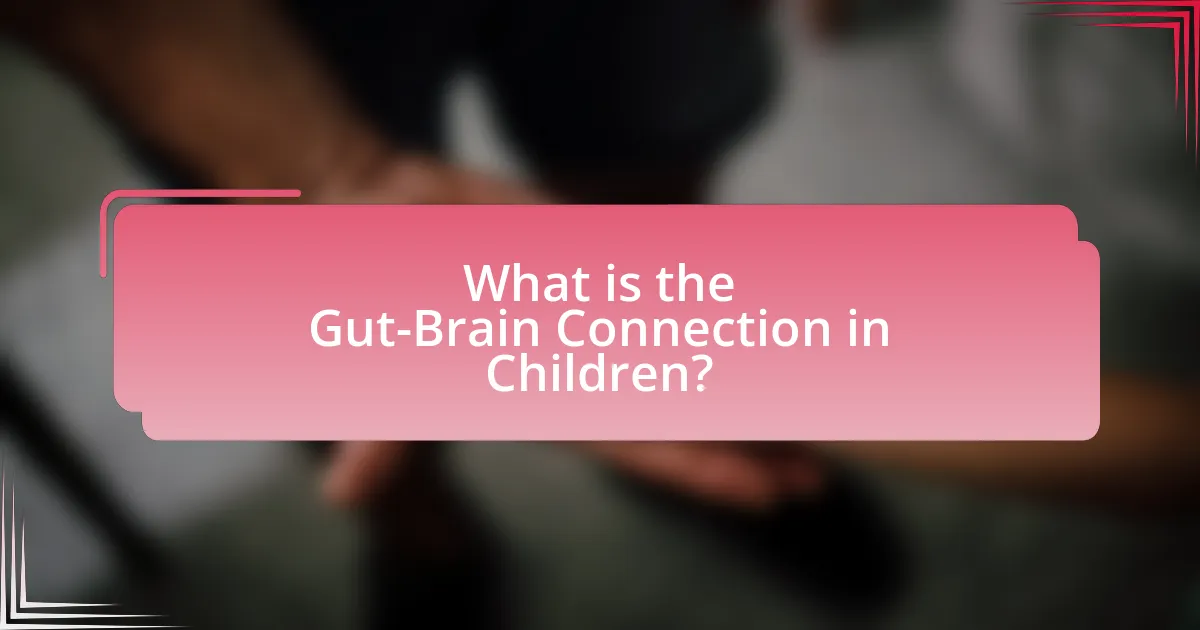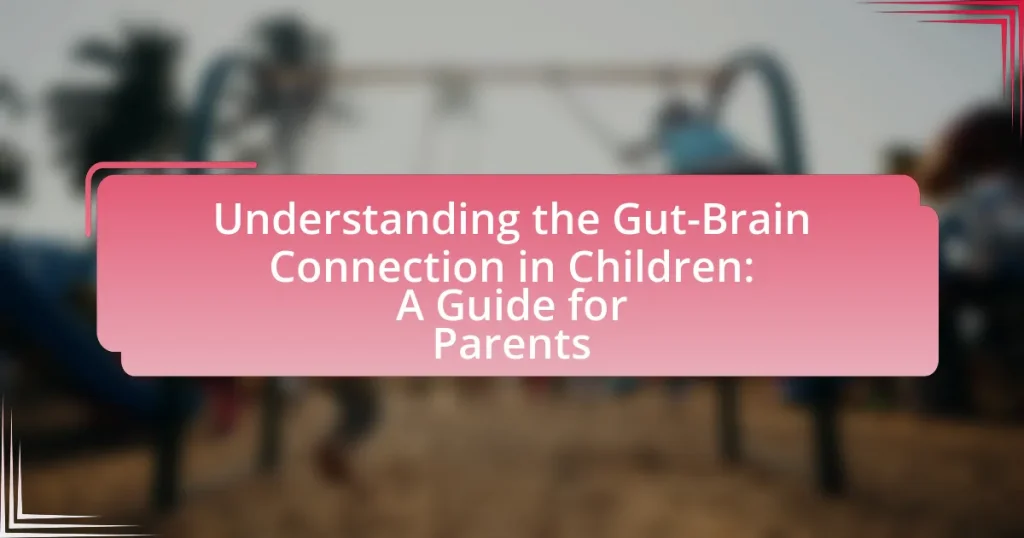The article focuses on the gut-brain connection in children, which describes the bidirectional communication between the gastrointestinal tract and the brain, influencing emotional and cognitive functions. It highlights the role of gut microbiota, neurotransmitters, and the vagus nerve in shaping a child’s mood, behavior, and overall mental health. Key components of the gut-brain axis are discussed, along with the impact of nutrition on gut health and its subsequent effects on emotional well-being. The article also outlines signs of gut-brain connection issues, strategies for parents to support their child’s gut-brain health, and the importance of lifestyle factors such as diet, physical activity, and sleep in maintaining a healthy gut microbiome.

What is the Gut-Brain Connection in Children?
The gut-brain connection in children refers to the bidirectional communication between the gastrointestinal tract and the brain, influencing emotional and cognitive functions. This connection is facilitated by the vagus nerve, neurotransmitters, and gut microbiota, which can affect mood, behavior, and overall mental health. Research indicates that a healthy gut microbiome can lead to improved emotional regulation and cognitive performance in children, as demonstrated in studies showing that probiotics can reduce anxiety and depressive symptoms.
How does the gut-brain connection influence a child’s development?
The gut-brain connection significantly influences a child’s development by affecting their emotional regulation, cognitive function, and overall health. Research indicates that the gut microbiome communicates with the brain through various pathways, including the vagus nerve and the production of neurotransmitters. For instance, studies have shown that a diverse gut microbiome can enhance mood and cognitive abilities, while imbalances may lead to anxiety and behavioral issues. A specific study published in the journal “Nature” by Cryan and Dinan (2012) highlights how gut bacteria can produce neurotransmitters like serotonin, which plays a crucial role in mood regulation and cognitive processes. Thus, the health of the gut microbiome is directly linked to a child’s emotional and cognitive development.
What are the key components of the gut-brain axis?
The key components of the gut-brain axis include the central nervous system, the enteric nervous system, the gut microbiota, and various signaling molecules such as neurotransmitters and hormones. The central nervous system, which includes the brain and spinal cord, communicates with the enteric nervous system, often referred to as the “second brain,” located in the gastrointestinal tract. The gut microbiota, consisting of trillions of microorganisms, plays a crucial role in modulating this communication by producing metabolites that influence brain function. Additionally, neurotransmitters like serotonin, which is predominantly produced in the gut, and hormones such as cortisol, are involved in the signaling processes between the gut and the brain. This intricate network highlights the bidirectional communication that affects both gut health and mental well-being.
How do gut microbiota affect brain function in children?
Gut microbiota significantly influence brain function in children by modulating neurodevelopment and behavior through the gut-brain axis. Research indicates that the composition of gut microbiota can affect neurotransmitter production, immune response, and inflammation, all of which are critical for brain health. For instance, specific strains of bacteria, such as Lactobacillus and Bifidobacterium, have been shown to produce neurotransmitters like serotonin, which plays a vital role in mood regulation and cognitive function. Additionally, studies have demonstrated that alterations in gut microbiota can be linked to neurodevelopmental disorders, such as autism spectrum disorder, highlighting the importance of a balanced microbiome for optimal brain function in children.
Why is understanding the gut-brain connection important for parents?
Understanding the gut-brain connection is important for parents because it influences their children’s emotional and cognitive development. Research indicates that the gut microbiome can affect brain function and behavior, with studies showing that imbalances in gut bacteria are linked to conditions such as anxiety and depression in children. For instance, a study published in the journal “Nature” by Cryan and Dinan (2012) highlights how gut health can impact mood and mental health, emphasizing the need for parents to be aware of dietary choices that affect gut microbiota. By understanding this connection, parents can make informed decisions about nutrition and lifestyle that promote both gut and brain health in their children.
What role does nutrition play in the gut-brain connection?
Nutrition plays a crucial role in the gut-brain connection by influencing the composition and function of the gut microbiome, which in turn affects brain health and behavior. A balanced diet rich in fiber, probiotics, and essential nutrients supports the growth of beneficial gut bacteria, which produce neurotransmitters like serotonin that regulate mood and cognitive functions. Research indicates that diets high in processed foods and sugars can lead to dysbiosis, negatively impacting mental health and increasing the risk of anxiety and depression. For instance, a study published in the journal “Nutrients” by researchers at the University of Alberta found that children with a diverse diet had a more varied gut microbiome, correlating with better emotional regulation and cognitive performance.
How can emotional well-being be linked to gut health?
Emotional well-being is linked to gut health through the gut-brain axis, which is a bidirectional communication system between the gastrointestinal tract and the brain. Research indicates that gut microbiota can influence mood and behavior by producing neurotransmitters, such as serotonin, which is primarily synthesized in the gut. A study published in the journal “Nature Reviews Gastroenterology & Hepatology” by Cryan and Dinan (2012) highlights that alterations in gut microbiota can lead to changes in emotional states, suggesting that a healthy gut microbiome is essential for maintaining emotional balance.

What are the Signs of Gut-Brain Connection Issues in Children?
Signs of gut-brain connection issues in children include gastrointestinal symptoms, behavioral changes, and cognitive difficulties. Children may experience stomachaches, bloating, or irregular bowel movements, indicating a disrupted gut microbiome. Additionally, they might exhibit increased anxiety, mood swings, or attention difficulties, which are linked to the gut’s influence on brain function. Research shows that the gut microbiome can affect neurotransmitter production, impacting mood and behavior. For instance, a study published in the journal “Nature Reviews Neuroscience” highlights the connection between gut health and mental well-being, emphasizing the importance of a balanced microbiome for optimal brain function in children.
What symptoms might indicate a problem with the gut-brain connection?
Symptoms that might indicate a problem with the gut-brain connection include digestive issues, mood disorders, and cognitive difficulties. Digestive issues such as bloating, constipation, or diarrhea can signal an imbalance in gut health, which is closely linked to brain function. Mood disorders like anxiety and depression often correlate with gastrointestinal disturbances, as the gut produces neurotransmitters that affect mood regulation. Cognitive difficulties, including problems with focus and memory, may arise when the gut microbiome is disrupted, impacting brain health. Research has shown that the gut microbiome influences brain activity and behavior, highlighting the importance of a healthy gut for optimal brain function.
How can digestive issues affect a child’s mood and behavior?
Digestive issues can significantly affect a child’s mood and behavior by disrupting the gut-brain connection, which is the communication pathway between the gastrointestinal system and the brain. When a child experiences digestive problems, such as bloating, constipation, or food intolerances, it can lead to discomfort and pain, which may manifest as irritability, anxiety, or mood swings. Research indicates that the gut microbiome plays a crucial role in mental health; for instance, a study published in the journal “Nature Reviews Neuroscience” highlights that imbalances in gut bacteria can influence neurotransmitter production, including serotonin, which is vital for mood regulation. Therefore, digestive issues can lead to alterations in mood and behavior due to their impact on both physical discomfort and biochemical processes in the brain.
What are the signs of anxiety or depression related to gut health?
Signs of anxiety or depression related to gut health include gastrointestinal symptoms such as bloating, diarrhea, constipation, and abdominal pain, which can manifest alongside emotional symptoms like persistent sadness, irritability, and difficulty concentrating. Research indicates that the gut microbiome influences brain function and mood regulation; for instance, a study published in the journal “Nature Microbiology” found that gut bacteria can affect neurotransmitter production, linking gut health to mental health outcomes. Therefore, children experiencing both gut issues and emotional distress may be exhibiting signs of anxiety or depression influenced by their gut health.
How can parents identify these signs early?
Parents can identify early signs of gut-brain connection issues by observing changes in their child’s behavior, mood, and physical health. Specific indicators include increased anxiety, mood swings, digestive problems, and changes in appetite. Research indicates that gut health significantly influences mental well-being; for instance, a study published in the journal “Nature Reviews Gastroenterology & Hepatology” highlights the link between gut microbiota and emotional regulation. By monitoring these signs, parents can take proactive steps to address potential gut-brain connection issues early on.
What observations should parents make regarding their child’s eating habits?
Parents should observe their child’s food preferences, portion sizes, and eating patterns. Noting whether a child prefers certain food groups, such as fruits or vegetables, can indicate nutritional needs or aversions. Monitoring portion sizes helps assess whether the child is eating enough or too much, which can impact growth and health. Additionally, parents should pay attention to the frequency of meals and snacks, as irregular eating patterns may affect the child’s mood and energy levels. Research indicates that children who have structured meal times tend to have better dietary habits and emotional regulation, reinforcing the importance of these observations.
How can changes in behavior signal gut-brain connection issues?
Changes in behavior can signal gut-brain connection issues by indicating disruptions in the communication between the gut microbiome and the brain. Research shows that alterations in gut health, such as dysbiosis, can lead to increased anxiety, mood swings, and behavioral problems in children. For instance, a study published in the journal “Nature Reviews Gastroenterology & Hepatology” highlights that gut bacteria influence neurotransmitter production, which affects mood and behavior. Therefore, noticeable changes in a child’s behavior may reflect underlying gut health issues that impact their emotional and psychological well-being.

What Strategies Can Parents Use to Support the Gut-Brain Connection?
Parents can support the gut-brain connection by providing a balanced diet rich in probiotics, prebiotics, and omega-3 fatty acids. Research indicates that probiotics, found in foods like yogurt and fermented vegetables, can enhance gut health and positively influence mood and cognitive function. Prebiotics, present in foods such as bananas and whole grains, promote the growth of beneficial gut bacteria, which are linked to improved mental health. Additionally, omega-3 fatty acids, found in fish and flaxseeds, have been shown to support brain health and reduce symptoms of anxiety and depression in children. By incorporating these dietary elements, parents can foster a healthier gut microbiome, which is essential for optimal brain function and emotional well-being.
How can diet improve the gut-brain connection in children?
Diet can improve the gut-brain connection in children by providing essential nutrients that support both gut health and cognitive function. A balanced diet rich in fiber, probiotics, and omega-3 fatty acids promotes a healthy gut microbiome, which is linked to improved mood and cognitive abilities. For instance, studies have shown that children consuming diets high in fruits, vegetables, and whole grains exhibit better mental health outcomes and cognitive performance. Additionally, specific probiotics, such as Lactobacillus and Bifidobacterium, have been associated with reduced anxiety and improved emotional regulation in children. This evidence underscores the importance of dietary choices in enhancing the gut-brain axis, ultimately benefiting children’s overall development and well-being.
What foods are beneficial for gut health?
Foods that are beneficial for gut health include fermented foods, fiber-rich fruits and vegetables, whole grains, and nuts. Fermented foods like yogurt, kefir, sauerkraut, and kimchi contain probiotics, which are live bacteria that promote a healthy gut microbiome. Fiber-rich foods such as apples, bananas, and leafy greens support digestion and help maintain gut health by feeding beneficial gut bacteria. Whole grains like oats and quinoa provide prebiotics, which are essential for the growth of good bacteria. Nuts, particularly almonds and walnuts, also contribute to gut health by providing healthy fats and fiber. Research indicates that a diverse diet rich in these foods can enhance gut microbiota diversity, which is linked to improved overall health and well-being.
How can parents incorporate probiotics into their child’s diet?
Parents can incorporate probiotics into their child’s diet by including foods rich in these beneficial bacteria, such as yogurt, kefir, sauerkraut, and other fermented foods. For instance, yogurt containing live cultures can be served as a snack or breakfast option, while kefir can be added to smoothies. Research indicates that probiotics can support digestive health and may positively influence mood and behavior, highlighting their importance in a child’s diet.
What lifestyle changes can enhance the gut-brain connection?
To enhance the gut-brain connection, individuals should adopt a diet rich in fiber, probiotics, and omega-3 fatty acids. Consuming foods like fruits, vegetables, whole grains, yogurt, and fatty fish supports a healthy gut microbiome, which is linked to improved cognitive function and emotional well-being. Research indicates that a diverse gut microbiome can positively influence brain health, as seen in a study published in the journal “Nature Reviews Neuroscience,” which highlights the role of gut bacteria in producing neurotransmitters that affect mood and cognition. Additionally, regular physical activity and adequate sleep are crucial lifestyle changes that further strengthen the gut-brain axis, as exercise has been shown to promote gut health and improve mental clarity, while sleep is essential for overall brain function and emotional regulation.
How does physical activity influence gut health?
Physical activity positively influences gut health by promoting the diversity and abundance of beneficial gut microbiota. Regular exercise enhances gut motility, which aids in digestion and nutrient absorption, and it also reduces inflammation, contributing to a healthier gut environment. Research indicates that individuals who engage in consistent physical activity have a more diverse microbiome compared to sedentary individuals, which is linked to improved metabolic health and reduced risk of gastrointestinal disorders. For instance, a study published in the journal “Gut” found that exercise can lead to significant changes in gut microbiota composition, highlighting the importance of physical activity in maintaining gut health.
What role does sleep play in the gut-brain connection?
Sleep plays a crucial role in the gut-brain connection by regulating the communication between the gut microbiome and the brain. Adequate sleep enhances the production of neurotransmitters and hormones that influence gut health, such as serotonin, which is primarily produced in the gut and affects mood and cognitive function. Research indicates that sleep deprivation can lead to dysbiosis, an imbalance in gut bacteria, which in turn can negatively impact mental health and cognitive performance. A study published in the journal “Sleep” by Walker et al. (2017) found that poor sleep quality is associated with increased levels of inflammatory markers in the gut, further linking sleep to gut health and brain function.
What practical tips can parents implement to support their child’s gut-brain health?
Parents can support their child’s gut-brain health by incorporating a balanced diet rich in fiber, probiotics, and omega-3 fatty acids. A diet high in fruits, vegetables, whole grains, and fermented foods like yogurt and kefir promotes a healthy gut microbiome, which is linked to improved cognitive function and emotional well-being. Research indicates that probiotics can enhance gut health and may positively influence mood and behavior in children, as shown in studies published in journals like “Nutrients” and “Frontiers in Microbiology.” Additionally, encouraging regular physical activity and ensuring adequate sleep are essential, as both factors contribute to overall gut health and cognitive performance.















